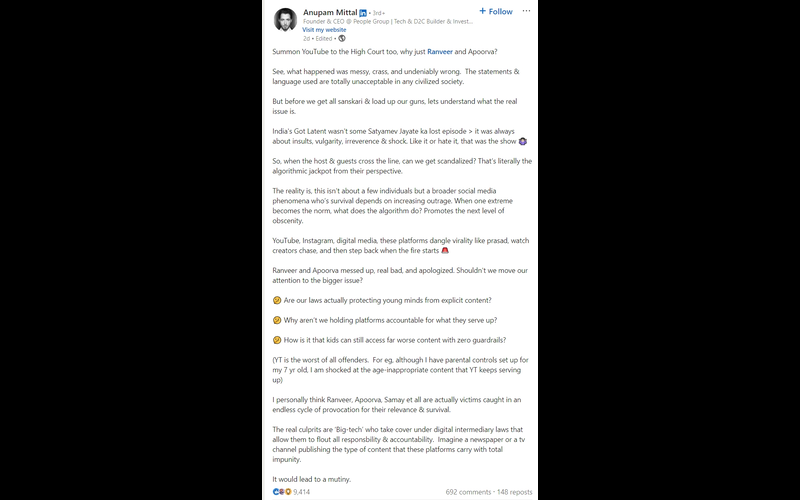The controversy surrounding India’s Got Latent has intensified as the Supreme Court has summoned Ranveer Allahbadia, Apoorva Mukhija, and others over their controversial remarks on the show. Amidst the growing debate, Anupam Mittal, a judge on Shark Tank India Season 4, has openly criticized YouTube and social media platforms for encouraging inappropriate content. He pointed out that the issue extends beyond a few individuals and is part of a larger social media trend.
Mittal took to LinkedIn to express his frustration, stating, “Summon YouTube to the High Court too, not just Ranveer and Apoorva.” He supported the argument that the remarks made by the YouTubers were unacceptable, asserting that such content had no place in a civilized society. However, he also highlighted the nature of the show itself, stating that India’s Got Latent was never meant to be a serious or moralistic program, but one that thrived on shock value and irreverence.
The Shark Tank judge emphasized that the real issue lies with social media platforms that profit from sensationalism. He remarked, “When one extreme becomes the norm, what does the algorithm do? Promotes the next level of obscenity.” Mittal directly called out these digital platforms, holding them responsible for fueling the controversy.
Further, he criticized platforms for manipulating content creators by offering them the allure of virality and then distancing themselves when controversy arises. He remarked that these platforms “dangle virality like prasad, watch creators chase, and then step back when the fire starts.” He acknowledged that Allahbadia and Mukhija made a grave mistake and have since apologized, yet he questioned whether the focus should remain on them instead of addressing the broader problem.
Mittal also expressed concern over content moderation on social media, questioning the responsibility of digital platforms. He shared a personal anecdote, revealing that despite implementing parental controls for his young child, he was still disturbed by the type of content YouTube recommended. He noted, “I am shocked at the age-inappropriate content that YT keeps serving up.”
Mittal further argued that the individuals involved were merely part of a larger system that exploits them. He described Ranveer Allahbadia, Apoorva Mukhija, and Samay Raina as victims rather than perpetrators, shifting the blame to Big Tech. He wrote, “The real culprits are ‘Big-tech’ who take cover under digital intermediary laws that allow them to flout all responsibility & accountability.” Drawing a comparison, he suggested that if traditional media such as newspapers or television channels had published similar content, it would have resulted in massive outrage. “Imagine a newspaper or a TV channel publishing the type of content that these platforms carry with total impunity. It would lead to a mutiny,” he remarked.

As the debate continues, the spotlight remains on both content creators and the role of social media in shaping online discourse. While Mittal acknowledged the gravity of the remarks made by the YouTubers, he urged people to focus on the systemic issue of how digital platforms operate. His statements have added fuel to the ongoing discussion, raising important questions about accountability in the digital age.








